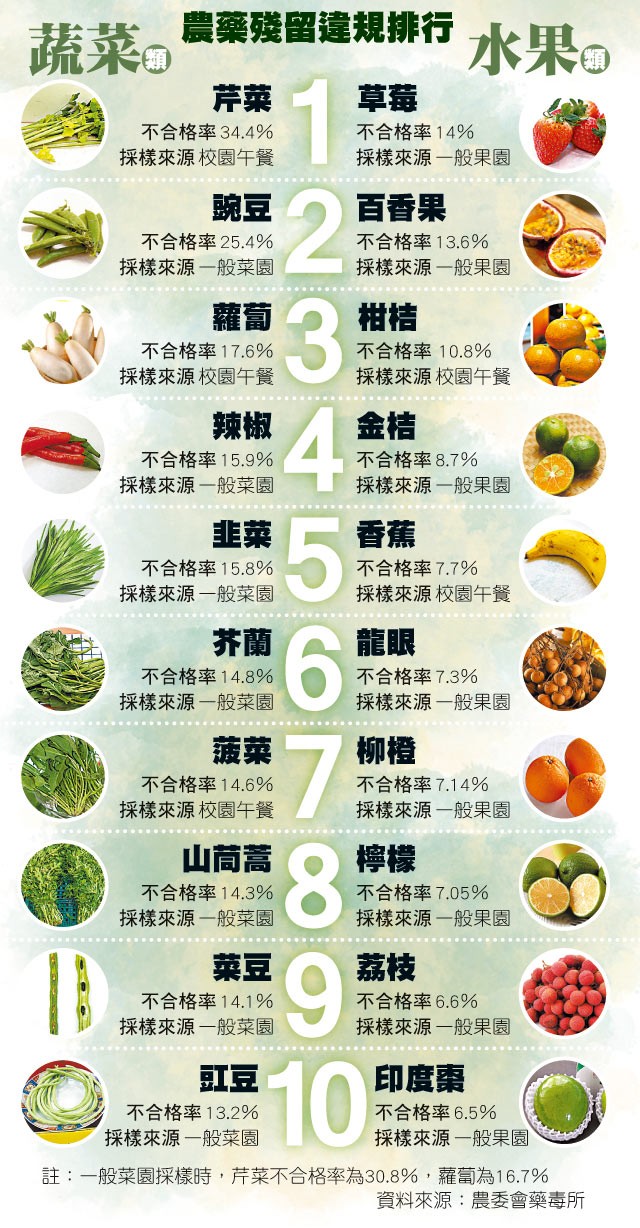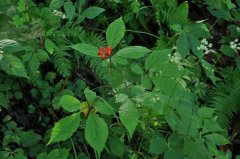Which vegetables and fruits have the most pesticide residues? Is it true that pesticide residues in leeks are the most serious?
The Institute of drugs and drugs of the Council of Agriculture tested pesticide residues in fruits and vegetables and found that strawberries ranked first in fruits, followed by passion fruits and oranges, while vegetables ranked first in celery, followed by peas and radishes.

But you don't need to be too nervous, because if you make further careful analysis, this time it is based on the inspection of fruit and vegetable garden and campus lunch in 2017, which collected 8847 pieces of vegetables and 5322 pieces of fruits, and found that the overall failure rate of vegetables was 5.1%. The failure rate of fruits is 3.1%. Vivien Qi, director of the Agricultural Drug and Toxicology Laboratory, believes that the failure rate of pesticide residues in advanced countries is about 4% to 5%, and so are the monitoring results in our country. About 80% of the major substandard fruits and vegetables are not registered on the crop, and the real pesticide "excess" is only about 20%.
Even so, Wayne suggests, most pesticides will not affect the human body as long as they are cleaned carefully. The method of cleaning is to soak in running water for 10 minutes. It is rumored that using vinegar and baking soda is not necessary and may even be harmful. In fact, only if something really affects the physiology of the human body and has a bad effect, can it be called poison. With such a pesticide problem, it has not yet produced such a reaction, it is called poison, it is purely for the purpose of scaremongering.
Then, as can be seen again from this data, leek ranked fifth at most, and the previous statement that leek was the most poisonous was completely self-defeating.
- Prev

Taichung 6, a new bean variety, has high yield and great potential for export to Japan.
The main producing area of edamame beans is in Gaoping area, but edamame beans cannot be produced in winter, and the industry hopes to fill this gap with soybeans. Taichung District Agricultural improvement Farm released "Taichung 6" dwarf beans on the 25th, which can be used for mechanized harvesting and cold chain equipment of edamame beans.
- Next

What are the common diseases of ginseng? Common Diseases and Control methods of Ginseng to understand the Disease Control of Ginseng
For many people, the process of growing ginseng is an exciting effort. Whether grown in containers at home or as income, this rare plant is so precious that many states have strict rules on the growth and sale of ginseng roots.
Related
- A course of planting techniques and methods on how to grow carrots
- How to plant the latest tulips?
- Is it better to pick tea in the morning or in the afternoon? When is the best time for tea to be picked? what is the third or fifth tea?
- Launch Yuanxiao Happy combination Haocha + Tea Yuan healthy Taste
- Penghu Tourism "Fireworks 20 Parade with You"
- 2022 West Lake Happiness holds "Digital Revitalization Voucher" and draws iphone13 and laptop.
- Banqiao Fuzhou social houses are designed to change start-up combined with police elimination to create a safe and livable environment
- The convenient measure of "mechanical weeding" in Xinbei has been abused and the Agriculture Bureau has imposed heavy penalties on the illegal land consolidation.
- Changgeng University Joins Hands with Four Memory Factories to Rescue Memory Talent Shortage
- The list of Taiwan's top 100 MVP managers is listed by the Director-General of the Farmers' Association of Sanxia District.

